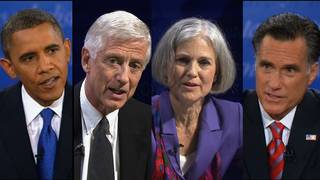
Topics
Guests
- Juan Coleprofessor of history at the University of Michigan. His blog, “Informed Comment,” is online at JuanCole.com. His most recent book is Engaging the Muslim World.
President Barack Obama has overruled top administration lawyers and decided he has the legal authority to continue involvement in the NATO air war in Libya, without congressional approval. Our guest, University of Michigan Professor Juan Cole, who supports the Libya operation, says Obama needs authorization from Congress in order to continue. “Not doing that has damaged the legitimacy of the war in the eyes of the American people,” says Cole. [includes rush transcript]
Transcript
AMY GOODMAN: I wanted to move, though, to—Professor Juan Cole, to another issue, and that’s the issue of Libya. The New York Times revealing President Obama rejected the views of top lawyers at the Pentagon and the Justice Department when he decided he had the legal authority to continue U.S. war in Libya without congressional authorization. In an interview on the PBS NewsHour, Senate Majority Leader Harry Reid said he supported the President’s decision nonetheless.
SEN. HARRY REID: The War Powers Act has no application to what’s going on in Libya.
JIM LEHRER: None?
SEN. HARRY REID: I don’t believe so. You know, we did an authorization for Afghanistan. We did one for Iraq. But we have no troops on the ground there, and this thing is going to be over before you know it anyway. So I think it’s not necessary.
AMY GOODMAN: That’s Senate Majority Leader Harry Reid on PBS. Juan Cole, one of your most recent pieces is “Top Ten Ways [that] Libya 2011 is Not Iraq 2003.” What about what President Obama is doing in Libya?
JUAN COLE: Yeah, well, I have a more recent piece on the top 10 mistakes that have been made in the Libyan war. And one of the issues that I have is that I think President Obama ought to have gone to Congress for authorization for this war. I think that it—I can understand why he was reluctant to do so. He wants to keep NATO together. This was a French and a British initiative coming out of the United Nations Security Council authorization. I think President Obama was not enthusiastic about it. Secretary of Defense Gates was not enthusiastic about it. If they could have avoided getting involved, they would have. But I think that they were afraid that if the U.S. went back to NATO and said, “Well, we can’t help take out anti-aircraft batteries for you, and we’re going to expose your planes to danger, because we’re just not going to get very involved,” then, you know, they would have said, “Well, we’re helping you in Afghanistan, and, you know, you’ve got long-term commitments to us.”
So, internationally, however badly this my play domestically, there were goals, with NATO cohesion and the U.S. position in the world, with regard to cooperation and security with allies that were at stake. But nevertheless, I think that the War Powers Act is such that President Obama could in fact have intervened to protect the allies by taking out anti-aircraft batteries and then could have turned around and gone to Congress for authorization to continue. And that’s what he should have done. And not doing that has damaged the legitimacy of the war in the eyes of the American people.











Media Options